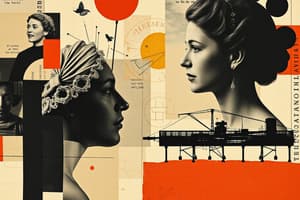Podcast
Questions and Answers
What is the primary focus when distinguishing the humanities from the sciences?
What is the primary focus when distinguishing the humanities from the sciences?
- The methods used to study human experience (correct)
- The level of scientific inquiry involved
- The employment opportunities in each field
- The historical significance of each field
Which concept is crucial to understand the Filipino identity within the context of the arts?
Which concept is crucial to understand the Filipino identity within the context of the arts?
- Cultural homogenization
- Modernism
- Pagkatao (correct)
- Colonial influence
What is examined in the study of art as a humanistic discipline?
What is examined in the study of art as a humanistic discipline?
- The evolution of art throughout history (correct)
- The cultural significance of artworks
- The techniques used in modern artwork
- The psychological impact of colors
In comparing Western and Filipino concepts of art, one should consider which aspect?
In comparing Western and Filipino concepts of art, one should consider which aspect?
How does the humanities play a role in Western civilization historical context?
How does the humanities play a role in Western civilization historical context?
What does 'humanitas' refer to in the context of humanities?
What does 'humanitas' refer to in the context of humanities?
Which view characterizes the Medieval period according to the history of Western civilization?
Which view characterizes the Medieval period according to the history of Western civilization?
Which phrase is associated with the Renaissance perspective on humanity?
Which phrase is associated with the Renaissance perspective on humanity?
What does the term 'barbaritas' indicate?
What does the term 'barbaritas' indicate?
Which perspective is described by the phrase 'Man is a piece of everything'?
Which perspective is described by the phrase 'Man is a piece of everything'?
Flashcards are hidden until you start studying
Study Notes
Module 1: Art and Humanities - Western and Filipino Concepts
- Humanities differentiate from sciences, focusing on cultural, philosophical, and artistic aspects of human life.
- Study of humanities traces its significance within Western civilization history.
- Western definition of humanities correlates with Filipino ideas of identity (pagkatao).
- Art is examined as an essential humanistic discipline, influencing identity and culture.
- Contrasts exist between Western and Filipino artistic concepts, reflecting different cultural values.
Objectives of the Module
- Understand distinctions between humanities and sciences.
- Explore the historical significance of humanities in Western civilization.
- Relate Western humanities concepts to Filipino personhood.
- Investigate art history as a humanistic discipline.
- Compare and contrast artistic views from Western and Filipino contexts.
- Discover Filipino identity through artistic expressions.
- Apply Filipino perspectives of art for deeper appreciation.
Etymology and Definitions
- "Humanities" derives from Latin "humanitas," meaning humanity; contrasts with "divinitas" (God) and "barbaritas" (savage state).
- The essence of art varies across cultures:
- Western: Academic elitism with a hierarchical perspective.
- Filipino: Emphasizes the process of becoming human (pagpapakatao).
Historical Views of Humanity
- Ancient Era (800 BC): Cosmocentric view, "Man is the measure of all things" - Protagoras.
- Medieval Era (300 AD): Theocentric view, "Man is created in the image of God."
- Renaissance (1400): Anthropocentric view, exalting human nature.
- Modern Era (1600): Scientific-technocentric view, presenting man as part of nature.
- Postmodern Era (1960): Eclectic view, recognizing the multifaceted nature of humanity.
Concepts of Art
- "Art" etymology links to Latin "ars" and Greek "techne," encompassing skillful production.
- Western artistic structure is organized hierarchically, with distinctions such as:
- Major Arts: Visual arts (painting, sculpture), Performing arts (music, dance), Linguistic arts (literature).
- Minor Arts: Servile arts (craftsmanship), practical skills labeled as "craft."
Filipino Concepts of Humanities and Art
- Filipino terms such as "tao" (human) and "pagkatao" (being human) inform understanding of humanities.
- Pagpapakatao refers to the ongoing process of becoming a fuller human being as a Filipino.
- Filipino Anthropology delineates the biological aspect of being human and the cultural journey of personhood.
Artistic Expression in the Philippines
- Philippine art reflects Western influences while maintaining a distinct identity:
- Juan Luna's "Spoliarium" showcases neoclassical influences.
- Amorsolo's "Planting Rice" embodies romantic realism.
- Manansala's works conform to transparent cubism.
- Indigenous arts such as Badjao and Igorot highlight unique cultural expressions.
Cultural Identity and Global Relations
- Filipino artistic identity is dynamic, encouraging interaction between Filipino and Western cultures.
- Embracing varied art forms fosters a richer appreciation of cultural heritage and diverse influences.
- Art critiques and evolves through cultural interaction, highlighting the importance of openness to change for coexistence.
Conclusion
- The study of art through humanities allows students to reflect on and discover their identity amid diverse cultural narratives. Insights into the Filipino sense of art enrich personal and collective understanding within a global context.
Studying That Suits You
Use AI to generate personalized quizzes and flashcards to suit your learning preferences.




